Hashimoto’s is the #1 cause of hypothyroidism in the United States.
This means that there is a huge chance that you have Hashimoto’s thyroiditis if you have low thyroid function to any degree.
And, believe it or not, the fact that Hashimoto’s is so common does not mean that it is diagnosed very often.
Most people who have it don’t know that they do!
But let’s put that aside for a moment…
One of the bigger issues surrounding Hashimoto’s is the fact that most doctors don’t care about making the diagnosis.
This might sound crazy at first but let me explain.
Your doctor is really only thinking about thyroid management in terms of whether or not you need thyroid medication.
He/she doesn’t care WHY you have thyroid problems they only care if you need thyroid medication.
And this mindset leads them to pretty much ignore Hashimoto’s as a diagnosis because they don’t consider it ‘treatable’ nor do they care about the disease until it impacts your thyroid enough to warrant the use of thyroid medication.
This may sound unsettling to you as a patient and it should be.
The good news is that you can do something about it (treatment-wise) AND you can order more tests than you think in order to find out the extent of the damage and to help direct treatment/therapies.
This article will walk you through the exact lab tests that I order on all patients with Hashimoto’s thyroiditis and give you some insight as to what these labs tell you.
Let’s jump in:
If you have Hashimoto’s (or think you might) Get THESE Lab Tests
If it isn’t already clear, you want to get ALL of these tests if you have a KNOWN diagnosis of Hashimoto’s and even if you just have regular hypothyroidism.
The reason is that many patients with hypothyroidism have Hashimoto’s without even realizing it.
And one of the good things about a diagnosis of Hashimoto’s is knowing you have it because the treatment is different from that of regular hypothyroidism.
Treating Hashimoto’s focuses both on managing thyroid function and on managing your immune system.
#1. Anti-TPO Antibodies
The first test that you should be aware of is something called anti-TPO antibody.
Anti-TPO stands for anti-thyroid peroxidase and these are antibodies that are created by your immune system that target a special enzyme found in your thyroid gland.
Honestly, what you really need to know is that the presence of these antibodies in your bloodstream indicates that your immune system is not functioning properly and are highly suggestive that you have an autoimmune disease.
The higher the antibodies in your blood the worse the condition (this isn’t always true but you can use it as a basic guideline).
So, if you have Hashimoto’s thyroiditis, you should be aware of not only this lab test but also your own personal VALUE.
When you get your TPO antibodies tested you will get a number.
You can track this number and use it as a proxy to determine if you are doing the right treatments.
As you do the right treatments you should see it go down.
Just for completeness’ sake, you should also be aware that not all cases of elevated TPO antibodies necessarily indicate Hashimoto’s thyroiditis.
You should also be aware that antibodies do not always track with your disease state.
These are general rules but they don’t hold true for 100% of people (just be aware of this but don’t let it confuse you).
#2. Thyroglobulin Antibodies
Thyroglobulin antibodies are another hallmark of Hashimoto’s disease and you can consider them very similar (but different) to TPO antibodies.
Thyroglobulin is a protein found in the thyroid gland that is important for creating and releasing thyroid hormone.
You should never see these antibodies in a normal healthy condition (1) because the thyroid gland is relatively protected from other areas of your body.
So the presence of these antibodies indicates thyroid inflammation and damage which has allowed your immune system to ‘see’ these proteins.
You should order BOTH thyroglobulin antibodies and anti-TPO antibodies if you have Hashimoto’s and you should track them both.
You will find that these antibodies rise and fall with your thyroid status and immune status.
As you improve your immune function you should see these antibody levels fall (much like anti-TPO antibodies).
You should also be aware that there is a connection between elevated thyroglobulin antibodies and the development of thyroid cancer (2) (another reason to get your antibodies down!).
#3. ESR
ESR is a really quick and easy way to assess the level of inflammation in your body.
ESR stands for erythrocyte sedimentation rate and it is a way to test how ‘sticky’ your red blood cells are.
The higher the ESR the more systemic inflammation there is in your body.
The more inflammation in your body the worse your immune system is doing which should be a sign that you need to target and lower that inflammation as soon as possible.

ESR should always be paired with CRP (more below) but you should be aware that these tests only assess for systemic inflammation.
Systemic inflammation is different from low-grade inflammation as low-grade inflammation may not be picked up by these lab tests.
But understanding if you have inflammation in your body is VERY important if you have Hashimoto’s due to the nature of this disease being immune-mediated.
#4. CRP
CRP stands for C reactive protein and it is another way to measure systemic inflammation in your body.
There are a couple of versions of CRP including the HS-CRP (high sensitivity CRP) and the standard CRP.
The HS-CRP is typically used to test for very low levels of inflammation and used to give you an idea about your risk of heart disease (3).
You can really use either as a patient with Hashimoto’s but you should understand the difference.
You should also realize that you can STILL have inflammation even if both the CRP and the ESR are negative or not technically “elevated”.
Many patients with Hashimoto’s have isolated thyroid gland inflammation or systemic low-grade inflammation both of which are not always picked up by ESR and CRP testing but are still very important as they carry the same risks.
Even though these tests aren’t perfect they are still a great cheap and effective way to assess inflammation.
#5. Vitamin D
Vitamin D should be tested if you have Hashimoto’s for several reasons!
The first is because there is a close association between low Vitamin D (vitamin D deficiency) and the development of autoimmune disease.
Meaning if you have low Vitamin D levels you are much more likely to develop Hashimoto’s, in the first place.
Knowing if you have low Vitamin D is obviously important in this setting because increasing your Vitamin D levels if it is low may actually help improve your immune system and therefore TREAT your condition.
There are even studies that show that the degree of Vitamin D deficiency CORRELATES with the number of antibodies in your body (4).
The lower your vitamin D level the higher your antibodies.
But the rabbit hole goes much deeper than this.
There is also a very strong and important connection between Vitamin D and thyroid function more generally.
Such that low levels of Vitamin D also increase your risk for thyroid cancer and Graves’ disease.
The bottom line is that you should be aware of your Vitamin D status if you have Hashimoto’s which means you need to be testing it semi-frequently (2 times per year should do the trick).
And, in case you were wondering, YES you will most likely have to ask your doctor for this test.
Most doctors are not aware of the important connection between Vitamin D and Hashimoto’s which means you NEED to be.
You can increase your Vitamin D level by using liquid Vitamin D3 supplements which work great for thyroid patients.
#6. TSH
Here is where we get into the more general thyroid lab tests which assess thyroid function.
By thyroid function, I am referring to how WELL your thyroid is actually working.
This matters for regular hypothyroidism but also for Hashimoto’s thyroiditis.
The thyroid antibodies present in Hashimoto’s will eventually cause some damage to your thyroid gland (sometimes irreversible, by the way) if they are not treated or kept in check.
So no matter where you are at in your Hashimoto’s journey, you need to be testing thyroid FUNCTION to assess how well your thyroid gland is actually working.
Early Hashimoto’s is generally associated with HIGH levels of thyroid function while late-stage Hashimoto’s is associated with LOW levels of thyroid function.
The LOWER your thyroid function the more likely you are to need thyroid medication to supplement whatever your own thyroid gland cannot produce.
The TSH helps you assess thyroid function (although, somewhat inaccurately) by telling you how well a portion of your hypothalamic-pituitary-thyroid axis is working.
Without getting too complicated, the TSH helps assess pituitary involvement and helps you understand if enough thyroid hormone is being produced.
If you are not producing enough thyroid hormone then your TSH will start to rise.
The higher your TSH goes the LESS your thyroid is working.
This is why when your TSH reaches a certain point your doctor will most likely put you on thyroid medication.
There’s only one problem with the TSH…
It doesn’t work very well as an isolated test for Hashimoto’s patients.
There have been many patients with Hashimoto’s who have a NORMAL TSH but who respond fabulously well to small doses of thyroid hormone.
This indicates that there is a discordance between the TSH and thyroid function in Hashimoto’s patients.
What does this mean for you?
It means you SHOULD test for the TSH but you shouldn’t live and die by its value and assume that it perfectly assesses your thyroid function.
If you still feel very poorly and have the symptoms of hypothyroidism then you may benefit from a trial of thyroid medication.
#7. Free T3
In line with this thinking is the need to test for what is known as your free thyroid hormone levels.
The TSH does NOT give you an accurate picture of these hormones by itself but you can test for them individually.
What do these lab tests tell you?
They tell you how much free thyroid hormone is available for use in your blood.
And in case you were wondering why it matters, consider the case of virtually just about every other hormone in your body.
If you wanted to know how much estrogen is in your body would you test for your estrogen level in the blood or would you test for your LH and FSH levels?
Of course, you would look directly at your estrogen levels.
By the way, LH and FSH are just measures of pituitary function much like the TSH is to your thyroid.
But for whatever reason, doctors have major blinders on when it comes to your thyroid.
They would rather look at your TSH (a measure of pituitary function) instead of your free thyroid hormone levels.
Even though we could argue, and I make this argument frequently, that your free thyroid hormone levels are more important.
Free T3 is especially important because it is a measure of the total amount of ACTIVE thyroid hormone in your blood.
T3 is the single most powerful and potent thyroid hormone in your body and, therefore, the most important to measure.
You may need to ask your doctor specifically for this test and don’t be surprised if you get pushback.
It wouldn’t be recommended, but you could ask your doctor why they only care about the TSH when they frequently order free estrogen and free testosterone levels when testing for menopause or andropause.
OR, you could ask why doctors don’t order FSH or LH when using birth control (or any test for that matter).
OR, you could ask why doctors don’t regularly test for ACTH when using prednisone.
All of these examples contradict the idea that the TSH would be the ‘perfect’ test for your thyroid.
The answer they try to fumble out would be amusing and would explain just how clueless your doctor probably is on the subject 🙂
The bottom line?
Get your free T3 tested because its level is important.
#8. Free T4
In line with free T3 is the free T4.
Even though your T4 isn’t as metabolically active as T3, it’s still important to measure.
The T4 is primarily produced by your thyroid gland so measuring your free T4 level can give you a rough idea as to how well your thyroid gland is functioning and how damaged it has become from your autoimmune disease.
Free T4 is not as important as free T3 but you should measure them together because it gives you information on something called thyroid conversion.
Thyroid conversion is the process whereby your body takes the inactive T4 thyroid hormone and turns it into the metabolically active T3 thyroid hormone.
Inflammation, one of the hallmarks of Hashimoto’s, DECAYS this process and slows it down (5).
If you have this issue then you may see a normal to high free T4 level and a low/low-normal free T3.
#9. Reverse T3
Lastly, you want to get a test called reverse T3.
Reverse T3 is an anti-thyroid metabolite that is formed when your body doesn’t convert T4 into T3.
So high levels of reverse T3 will slow down thyroid function and may lead to hypothyroid symptoms.
Unfortunately, reverse T3 is another test that your doctor may push back on if you request it.
Even if your doctor pushes back you should still get this test because it helps give a complete picture of your thyroid.
There’s just no way that you can look at tests like the TSH and free T4 and consider your thyroid picture to be ‘complete’.
These basic tests don’t tell you how much active free thyroid hormone is present or how well your body is utilizing the conversion process.
And ALL of these tests should be considered “required” when you go in to get your blood drawn.
I could talk all day about the importance of reverse T3 so if you haven’t heard about it make sure that you check out these articles:
- Causes of high reverse T3
- Reverse T3 treatment guide
- How to calculate your free T3:reverse T3 ratio
How to get these tests!
The absolute best place to get these labs is straight from your doctor.
It will require a written prescription to get them drawn but this will ensure that you have the highest chance of insurance covering them.
I’ve mentioned several times that your doctor may give you some pushback on some of the tests listed above.
If that happens do NOT settle for an incomplete set of labs.
Getting an incomplete set of labs is just really not helpful because it doesn’t help you target your therapies/treatments.
Try to get your existing doctor to work with you and ask if they are willing to order these tests.
If they aren’t then you have a couple of choices:
#1. Find a new doctor (recommended).
Or #2. Get the labs drawn yourself (second best option).
You’ll need a good doctor to work with you eventually so you might as well spend the time and energy to find one.
But, you don’t necessarily have to wait for a new doctor in order to get your labs drawn.
There are a handful of places where you can get your labs drawn without a doctor’s prescription.
The only downside to these places is that they aren’t covered by insurance which means you will need to pay cash (which can get pricey).
Final Thoughts
These labs are pretty much what I would consider to be the basics for ANYONE with suspected Hashimoto’s or known Hashimoto’s.
I would strongly encourage you to get these labs even if you’ve had a known diagnosis of Hashimoto’s for many years.
On the other hand, you will also want to get these labs even if you have regular hypothyroidism.
I pretty much get this basic set of labs on EVERY thyroid patient because the information is always helpful.
Now I want to hear from you:
Have you had this complete Hashimoto’s lab panel done before?
If so, what did your lab tests tell you?
If not, are you planning on getting this panel?
Do you have a doctor who you think will order them for you?
Leave your answers, comments, or questions below!
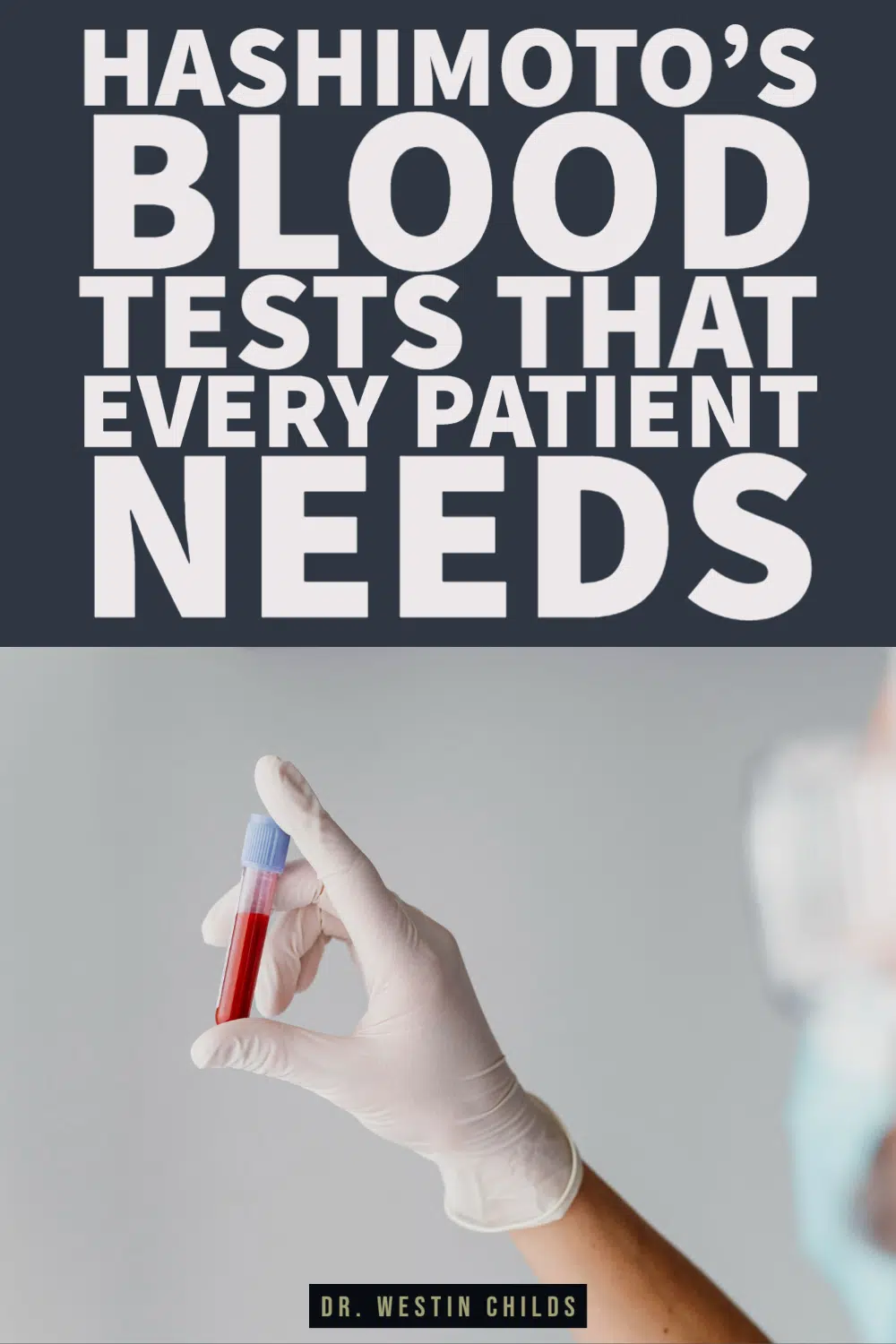
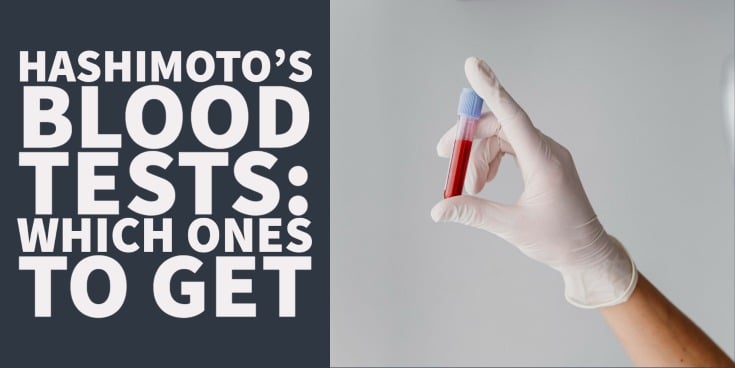
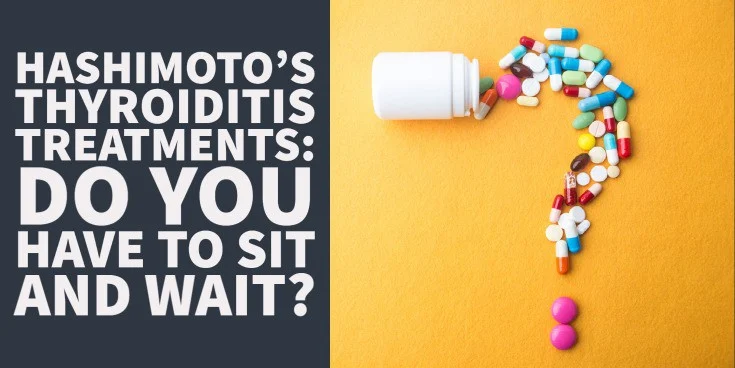

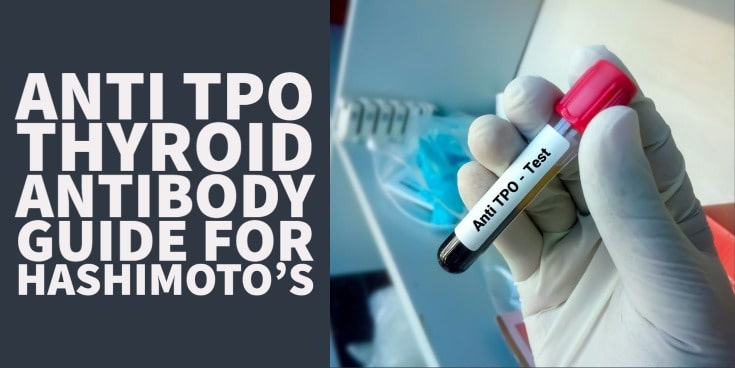
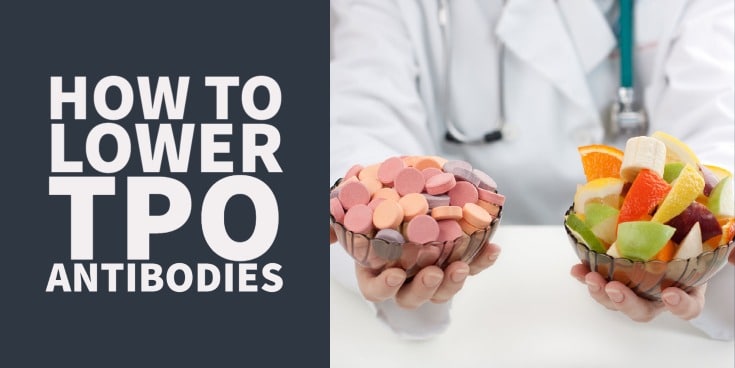
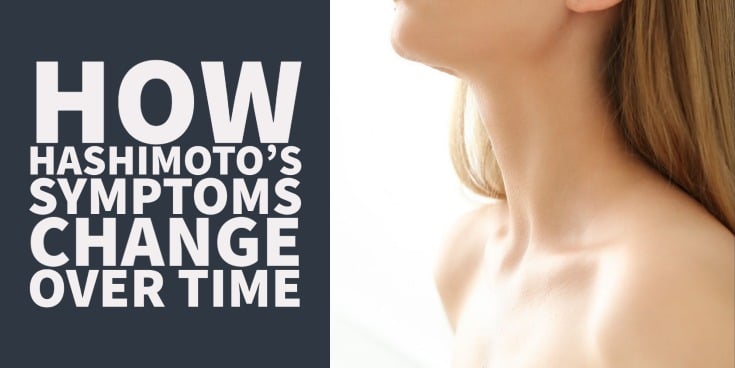


When I was pregnant my TSH was high (4.2) then they did another test TSH (2.7) and FT4 which was normal. Didn´t treat me for anything. I lost my baby. Now I´m trying to find someone who will do these tests and I won’t give up until I have it.
Hi Ivana,
I’m sorry for your loss but thank you for sharing your story so others can read it. It sounds like you are on the right track now.
Fantastic post!
What are the factors that differentiate hypothyroidism from Hashimotos?
I no longer have a thyroid gland. I take thyroid medicine. But I still have all the symptoms of hashimotos. What test should be performed to confirm hasimotos?
Thank you
Hi Cheryl,
I would take a look at this article which explains the differences in detail: https://www.restartmed.com/hypothyroid-vs-hashimotos/
I live in Canada and it’s very hard to get a lot of these tests with our socialized system of medicine (even if you offer to pay for them yourself).
When the borders re-open, I would like to get tested in the States. How do I find out which doctors or labs provide this service?
Hi Chrystyna,
You can get them at virtually any lab so that’s not the problem. You just have to find a doctor willing to order them which can sometimes be difficult but certainly not impossible.
lef.org for tests
Have u tried a naturopath. I am Canadian and have more luck with naturopath than my family doctor. My extended benefits pay for bloodwork
After I went through menopause I went to a physician that determined I had hypothyroidism. I had all the symptoms, but didn’t know anything about hypothyroidism. After being prescribed Synthroid and still having the same symptoms I researched hypothyroidism. I asked for natural thyroid hormone and was subscribed it. I have felt great since taking Naturethroid. I think it is awful that most doctors don’t know how much better natural thyroid hormone really is. Doctors need to be trained better!
Hi Marilyn,
I think the training is generally good but the things they are being trained on are incorrect so it’s more a problem with the source of information rather than the source of training. And to make matters worse the field of medicine moves like the Titanic so it will be many years before the average doctor starts using these types of medications and therapies.
I asked my previous doc how many hours of training she had for thyroid. Her reply was one hour for the endocrine system. I now have an ARNP who works with me, but reluctantly. I have another nurse midwife back in school who graduates in 2023. Her summer classes are re: the endocrine system. I’ll be switching when she’s back in the office. She’s motivated to help people with thyroid issues and uses more natural modes of treatment.
I’ve always had optimal to high FT4 but never over 1.8. Up until 2017 I had optimal FT3 of 3.6-3.8 and then they started to fall to 2.5-2.7. Dr always tested Free and total T3 and despite seeing the declining numbers and my debilitating symptoms he diagnosed me with fibromyalgia and even tried to drop my Levo when my FT4 was only 1.6 !!! Then sent me to to the chiropractor and he sent me to physical therapy! A load of ding dongery.
My TPO was less than 1 and my TGA were 4. I’m not sure if that’s terrible or fixable. I was also flagged for low iodine and B-12, low VitD. With what you’re describing here it sounds like Hashimotos is coming on. Back in 2016 I relaxed my strict diet quite a bit so not sure if that has something to do with my declining conversion. It’s hard to know if diet led to inflammation, which led to declining conversion, which led to digestive problems resulting in nutrient issues.
Drs never tried to shrink my hurthle cell adenoma before doing a partial on me so I’ll never know if it was just something simple like an iodine deficiency but of course now they made me hypo for life. It’s always been on my mind whether it’s autoimmune or not.
I vascillate between higher and lower TSH, They are in the low normal or high normal range but I feel best at the low normal and over 2.5 I know I am not right. the lab test range are from .46-4.5 My doctor knows I have to be in the lower range of.3-3 and she will always change my dose if I am higher but sometimes she lowers the dose at .3
I do not know why I vascillate. Ican go from .3 to 4.1 in three months or less lnd then back to .6 or lower.
I have had all the test you describe but not every time.
I’ve been on 75 mcg for 20+ yrs, and 25mcg cytomel for 16 years. Having issues this past year with original symptoms showing up: weight gain, elevated b/p, cholesterol, and having a ridiculously difficult time finding a thyroid literate dr. Had labs June 14, Ft4-0.8, (0.8-2.2) FT3-3.3 (2.8-5.3)TSH-0.03 (0.47-4.68) vit D-72(30-100) went to endocrinologist-prescribed 100 mcg synthroid (gave me three boxes of samples) and changed my cytomel to 5 mcg. I’m fearful of taking the 100, as another dr bumped me up to 88 last Fall and I had racing heart and other adverse effects. This dr said I am diabetic, (HA1C-6.0) insulin resistant and wanted to put me on metformin. I eat extremely healthy, green and clean and am very active-12,000 steps/day minimum. I’m searching. Again. Frustrated-need my prescription filled for original cytomel. Ugh.
I’ve had trouble getting my FP to order thyroid tests other than TSH. In Jan I saw a naturopath who increased my levithroxine to 125mcg from 100mcg that I’d been on for 20 yrs and added cytomel 25 mg.
My fatigue reflux and overall feeling poorly plus joint pain subsided. I recently saw my FP to get all the tests you recommended but she was reluctant to order. She would not do reverse T3/4 My TSH was .015 and TPO 21. She was very alarmed about my low TSH and decreased levothyroxine to 112mcg and cytomel to 15 mcg. Diagnosed autoimmune thyroid disorder and f/u in 2 mos. the fatigue is returning my voice is hoarse my joints are achy and I have a morning cough. Am perplexed as to what I should do.
I am unable to get the blood tests done via my go in the uk. I did pay for a blood test and took the results to my go but they were dismissed. I would like to get the full blood test that you recommend but not sure how to find a suitable private company to arrange this
Hashimoto runs in my family like water…my sister just recently diagnosed, ALL of my cousins on my Mother’s side of the family have some type of thyroid issue, Hashimoto’s, Hypothyroid, Hyperthyroid. My Great Grandmother had her thyroid removed (loooong time ago). Oddly enough, my Mother has no issues with her thyroid (I think she’s the only one). I’ve been diagnosed with Hypothyroid but I highly suspect it is Hashimoto. I brought this up with my Dr. but she said it’s a waste of time to test because it’s the same treatment. When first diagnosed 3 years ago, I had very low iron levels, very low Vit D levels, and my TSH was 19. I was having “spasms” where my throat would close and I couldn’t get air in or out…and I basically got very sick. I told the Urgent Care Dr. that I was having problems swallowing so they did an xray on my throat and she told me that there was “something in my throat” and immediately sent me to an ENT (which was useless). Anyway, 3 years later, still trying to get my med levels right and gaining weight like crazy and totally exhausted all the time! How do I find a Dr. that will test for this and take my insurance? I’m desperate but can’t afford expensive Drs. and treatments!
love how you mentioned that Doctors do not care nor do they listen I know this first hand I am not originally from Ohio living here now and was diagnosed with T cancer the doctor refused to test me even after a ultrasound and FNA she missed seeing a 4.cm After being my own detective and finding a new primary etc was diagnosed with papillary bilateral multifocal and the only reason I was diagnosed at all with hypo and Hashimoto’s is because of hysterectomy either than that I may be dead and now have a new tumor which again they will not do anything about till October just crazy how they truly will not help nor is there any help when dealing with thyroid issues on my third endrocologist
I live in Ohio and the doctors here are all ruled by the drug companies, We have a saving grace in numerous walk in labs .while my wife and I have medicare and the best suppliment I have been paying out of pocket. Our best only know TSH t-3 and T-4 we go the other route and order and pay for a complete thyroid panel. increased iodine ,Zink, sellenium, and other trace minerals including remag(.No doctor needed) The last order was $600. and worth every cent for all the orders that I wanted.
Hello, Thank you for this information. My PCP said I don’t need treatment. Should I have a second opinion.
TSH 8.20
Thyroglobulin Antibodies 2
Thyroid Peroxidase Antibodies 310
T4 5.5
Free T3 2.8
I am tired, gained alot of weight, brain fog general feeling of malaise.
Thank you for reading
Rebecca
I would definitely get a new doctor/second opinion if I were you! — I’m not a medical professional, but your numbers/description closely match what I experienced when I was diagnosed with Hashimotos. You can feel better! Don’t accept this as a ‘new normal’ or just part of aging.
Hello, Dr. Westin Childs
I diagnosed with Hashimoto’s for last 25 years.
Never had thyroglobulin is getting high . TSH was always normal.
My TPO used to be 800+ , now under 200 .
But , suddenly my thyroglobulin is getting higher every time I check. In January 2021 it was 86 . My dr. says to me do not worry about it , but it’s concerning me . Ultrasound shows nothing but overall inflamed thyroid overall.
What are those numbers trying to tell me ?
I’ve always suspected hashimoto’s since it runs in my family, but my TSH has always been about 4. Which, depending on the year and lab who ran the results, it has either been high or normal — but high.
I recently had a weird rash that the urgent care did blood work to see if I had ANA, which came back positive with speckled pattern. My PCP is supposed to refer me to a rheumotologist, but has yet to return my calls or emails where I forward the lab results.
I’m willing to just order the labs myself. But my question is this: I’ve now been on prednisone for 3 weeks (initially rxd by urgent care, then he referred me to a dermatologist who upped the daily dose and extended the treatment).
Is there any reason to wait until I’m off prednisone to get the blood work listed here? If I’m paying out of pocket, I certainly don’t want the results tainted due to the meds. 🙂 Thanks
Hi MissTea,
If you are paying out of pocket then you may want to wait. If insurance is covering it then I’d say just get it now and then get them retested after.
Hi, I had blood tested recently and one was “Total T4” at 11.4 mcg. Is Total T4 the same as Free T4? The other tests were TSH at 0.89 mI/UL and Free T3 at 3.1 pg/ML. I’m somewhat concerned why the Total T4 is in the moderately high range with the rest of my results looking so “normal”.
Hi Katherine,
Total T4 is not the same as free T4. Total T4 includes both bound and free T4 while free T4 records only the thyroid hormone that is free and active and not bound to a carrier protein.
Thank you for this wonderful information. I’m having my blood work done in a few days. Do you recommend holding off on my Synthroid until after my blood draw. I typically take my meds at @2AM
I usually take them as scheduled but I do fast until 1pm most days.
Thank you!
Hi Katy,
Yes, you’d want to hold off on taking your thyroid medication.
Good to know! I’ve recently changed dr’s and my TSH has been 8.5-9.9 the last two times I’ve had bloodwork. But my free T3 and T4 are fine. My new dr will not address the TSH number at all. Is that ok? I hate to question a dr but I’ve never had a dr allow my TSH to get that high without addressing it.
Hi RW,
Not if you are symptomatic! A TSH that high is indicative of low thyroid function that should be addressed before it becomes a bigger problem.
– or –
Latest values:
10
Name
Standard Range
5/27/20 6/7/21 6/14/22 9/20/22 2/28/23 4/25/23 5/2/23
Thyroxine, Free (FT4)
0.52 – 1.21 ng/dL
1.18 0.97 1.08 0.95 1.00 1.24 H 0.99
TSH
0.34 – 5.66 µIU/mL
2.72 2.43 3.84 3.22 2.49 1.43 1.99
Name
Standard Range
Thyroxine, Free (FT4)
0.52 – 1.21 ng/dL
TSH
0.34 – 5.66 µIU/mL
i do not have a thyroid i had a tumor was in thyroid storm then went into hypo now i know i have hashimotos im waiting to hear from my doctor i dont know what she can determine here to say i have hashimotos can you tell me
Would you recommend pushing for a thyroid ultrasound? My labs are normal but not optimal and every doctor has sent me on my way
Hi Monica,
An ultrasound would give you additional information and would probably be a good idea if you think your thyroid is contributing to your symptoms. It’s also pretty cheap and easy to get so there’s very little downside.
Here are my results… was told all was normal.
Anti-TPO: 1
Thyroglobulin: <1
ESR: 2
CRP: 1.6
Vit D: 78
TSH: 1.31
Free T3: 3.1 (range is set at 2.3-4.2)
Free T4: 1.3 (range is set at 0.8-1.8)
RT3: 13 (range set 8-25)
46 yrs old, gained 20-30 lbs in less than 2 yrs doing nothing different. Fatigue also. What could be happening? What can I do? Thanks for your help.
Hello Dr. Childs
I found the information you shared on this website concerning Hashimoto’s Disease{Awesome} ! Just fascinating
I understood the information thank you so much
I am helping my mom with her symptoms of thinning hair and the hives called {Wheals}
I am excited to share the information you have on this site with my mom tomorrow
I agree doctors do have blinders when it comes to the {Thyroid}
My mom was asked by her doctor if she colored her hair, due to the thinning……knowing my mom has a thyroid problem
I am hopeful I will be able to help my mom better because of you
Thank you so much !!!
Hello, Dr. Child’s. I was diagnosed with Hypothyroidism in 2023 at age 68. My usual TSH reading jumped from between 2-3 to over almost 12. My GP only tests for TSH. This year, I’ve been having issues with the numbers going into hyper (just under the “normal” level) and my cholesterol went up dramatically. NOW my GP is concerned, and is throwing the threat of statins at me, and the possibility of going to an endocrinologist to see if I have Hashimotos, all because my GP has run only the TSH level tests, and none of the other necessary tests that would indicate Hashimotos (which I don’t think I have). I’ve had my thyroid meds readjusted – again – and going for another blood test in 2 weeks. We ARE going to have a discussion about these other tests you recommend. I’ve noted that my cholesterol levels seem to be tied to the thyroid issues. My GP COULD order these tests, but doesn’t seem to want to. Plus, the conversation took a dark turn when my GP wants me on the Mediterranean Diet, and I told him I’m mostly Keto oriented (low carbs – next to no sugar – vegetables & fruit, and yes, I eat beef, pork and chicken). I was basically threatened with possibly being dismissed as a patient, if I didn’t agree to take a Statin. I’ve always had exceptionally good HDL levels, normal range triglycerides, and my LDL was high last time. I was told I need to be ready to have the Statin conversation on the next visit. At almost 70, I can’t see the point. Any suggestions for my conversation would be helpful.
Hi Debbie,
I would recommend reading this article which provides more information regarding statin use in hypothyroid patients: https://www.restartmed.com/should-you-take-a-statin-if-you-have-hypothyroidism/